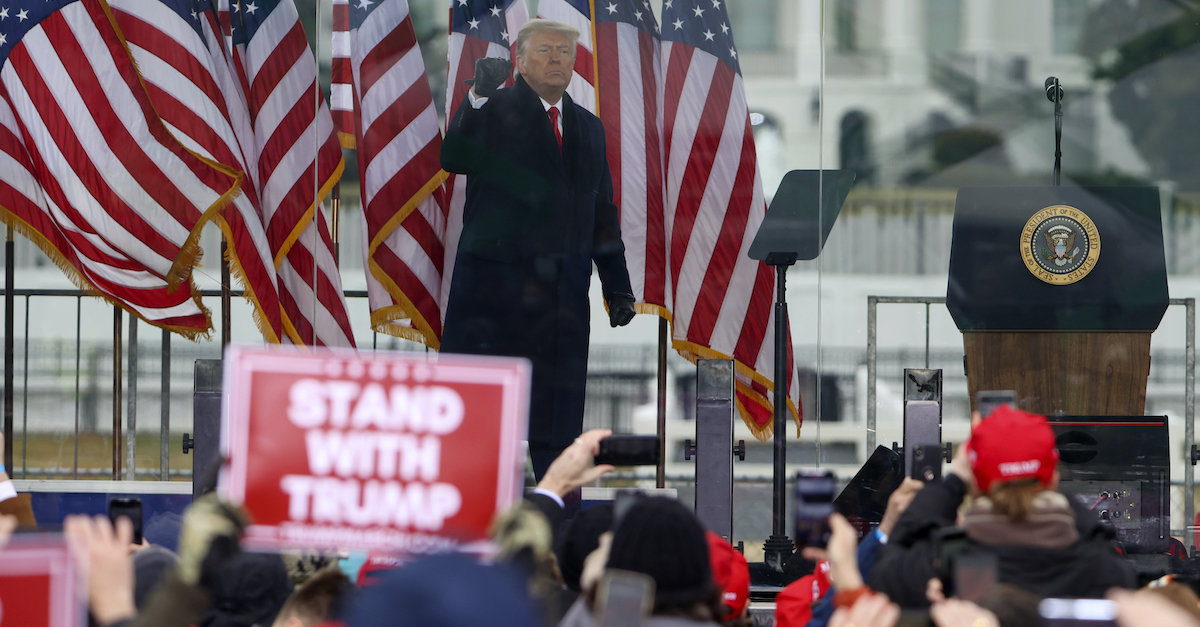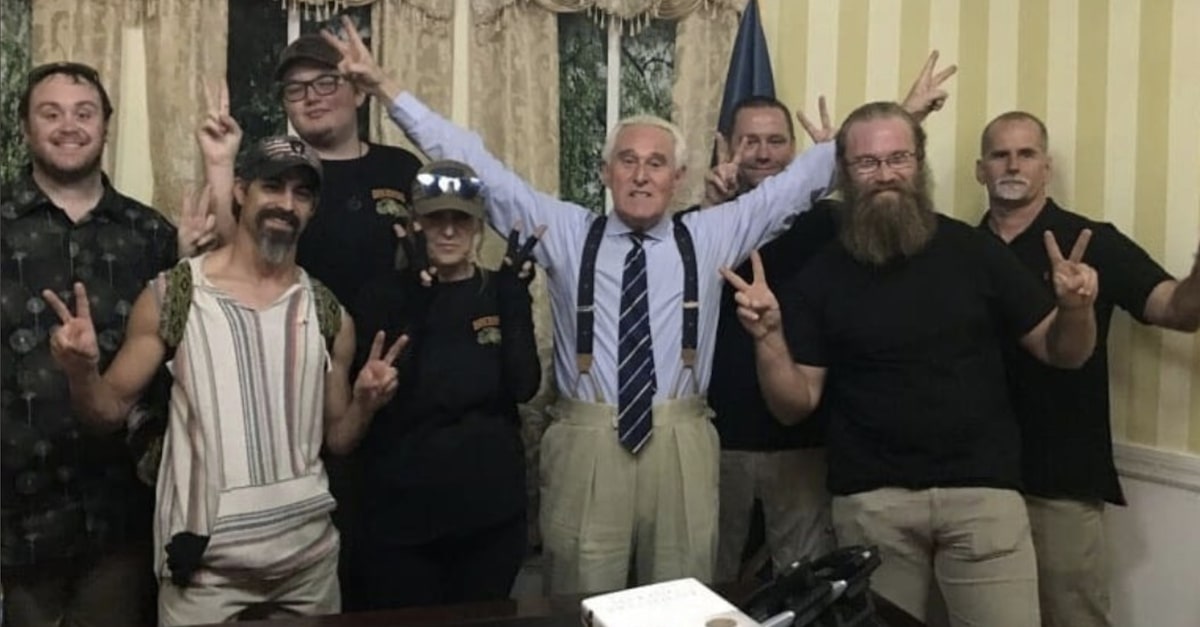
Former President Donald Trump delivers a speech at the Ellipse on Jan. 6, shortly before his mob of supporters ran riot inside the U.S. Capitol. (Photo by Tasos Katopodis/Getty Images)
Former President Donald Trump failed to dismiss another — and more massive — complaint in a growing pile of federal lawsuits seeking to hold him liable for the events of Jan. 6, 2021.
“What is unique about this case is the number and type of named defendants,” U.S. District Judge Amit Mehta‘s ruling on Thursday states. “The earlier actions focused mainly on former President Donald J. Trump and attempted to hold him liable for the events of January 6th. Those actions included a few individual defendants and some groups.”
The latest lawsuit to proceed to discovery, filed by seven U.S. Capitol Police Officers, also named dozens of his allies and extremist groups as co-defendants: 20 people and six entities.
“These Are Not First Amendment-Protected Activities”
A little less than a year ago, Judge Mehta rejected Trump’s contention that the First Amendment absolutely shielded him from liability from his supporters’ violence and ransacking of the U.S. Capitol on Jan. 6th. That ruling advanced a set of three federal lawsuits in Mehta’s courtroom. Those included allegations that Trump violated the Ku Klux Klan Act, a Reconstruction-era law designed to deter white supremacist groups from interfering with the rights of formerly enslaved people.
The law has become used more broadly in recent decades to punish conspiracies to interfere with civil rights.
In November, a separate federal judge advanced similar claims by civil rights groups, again rejecting Trump’s claim of absolute immunity.
For Judge Mehta, the case filed by the septet of law enforcement officers, led by 32-year U.S. Capitol Police veteran Conrad Smith, stands alone in its massive size and scope. The defendants include Trump, right-wing activist Ali Alexander, WalkAway founder Brandon J. Straka, Republican operative Roger J. Stone, Jr., and several members of the Oath Keepers and Proud Boys. Several Oath Keepers stand convicted of seditious conspiracy, including the group’s leader Stewart Rhodes. Another seditious conspiracy trial against Proud Boys members remains ongoing.

Roger Stone holds his arms in a “V” and pops up victory hand signs in a Richard Nixon style in this photograph with Oath Keepers members. (Photo via DOJ)
The Proud Boy defendants are leader Enrique “Henry” Tarrio, Ethan Nordean, Joseph R. Biggs, Zachary Rehl, Charles Donohoe and Dominic Pezzola. The Oath Keepers named in the lawsuit are founder Stewart Rhodes, Thomas E. Caldwell, Jessica Watkins and Kelly Meggs.
In addition, the lawsuit also accused members of the so-called Three Percenters, an extremist group that takes its name from the erroneous belief that that is the fraction of colonists who overthrew the British during the American Revolution. Those defendants are Alan Hostetter, Russell Taylor, Erik Scott Warner, Felipe Antonio Martinez, Derek Kinnison, and Ronald Mele. The Oath Keepers and Proud Boys’ corporate entities are also named, along with Make America Great Again PAC and Stop the Steal LLC.
In a mixed ruling, Mehta found that some of them enjoyed First Amendment protection for their alleged conduct on Jan. 6, while others did not.
“Several Defendants argue that all claims must be dismissed against them because they rest exclusively on First Amendment protected activities,” the ruling states. “The court agrees with some Defendants but not others.”
As for the Proud Boys’ explicitly organizing a group of fighters to storm the U.S. Capitol, the judge noted: “These are not First Amendment-protected activities.”
“The Opposite of ‘Imminent'”
Two far-right operatives, however, succeeded in their First Amendment arguments.
“The court reaches a different conclusion as to Stone and Alexander,” Mehta continued, adding that he views them similarly to how he viewed Rudy Giuliani and Donald Trump Jr., who were dismissed as defendants from a similar lawsuit.
“Moreover, neither is alleged to have participated in the attack on the Capitol on January 6th nor done anything in support of the alleged conspiracy other than engage in protected expression,” Judge Mehta wrote.
Stone was a key figure — though mostly in the background — in the sagas of the Oath Keepers and Proud Boys. The Jan. 6th Committee noted that both extremist groups had encrypted chat rooms named “F.O.S.,” short for “Friends of Stone.” Stone appeared in photographs with Oath Keepers members, who were assigned to him as security detail, but “these allegations do not allege any unlawful activity by Stone with respect to these groups.”
“Alexander also is alleged to have had contacts with the Proud Boys, but not for any unlawful purpose,” Mehta added.
Though the defendants derided claims of a conspiracy with Trump as “far-fetched,” Mehta noted that he previously found allegations that the former president conspired with the Proud Boys and Oath Keepers was at least “plausible.” He said the same was true of the Three Percenters. He did, however, strike Straka from the conspiracy count.
The lawsuit also sought injunctive relief to prevent a repeat of an attempt to block the certification of an election.
For Mehta, however, a crucial element of that request was missing: an “imminent” injury.
“Anticipating an injury more than two years into the future is the opposite of ‘imminent,'” he wrote.
Attorneys for the law enforcement officers who filed the lawsuit did not immediately respond to a request for comment.
Trump, through his election-denying attorney Jesse Binnall, filed an appeal to the D.C. Circuit.
Read the opinion below: